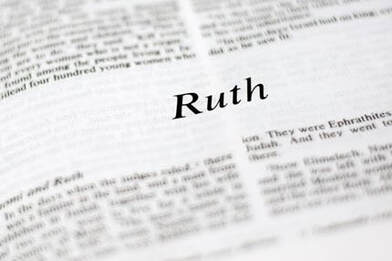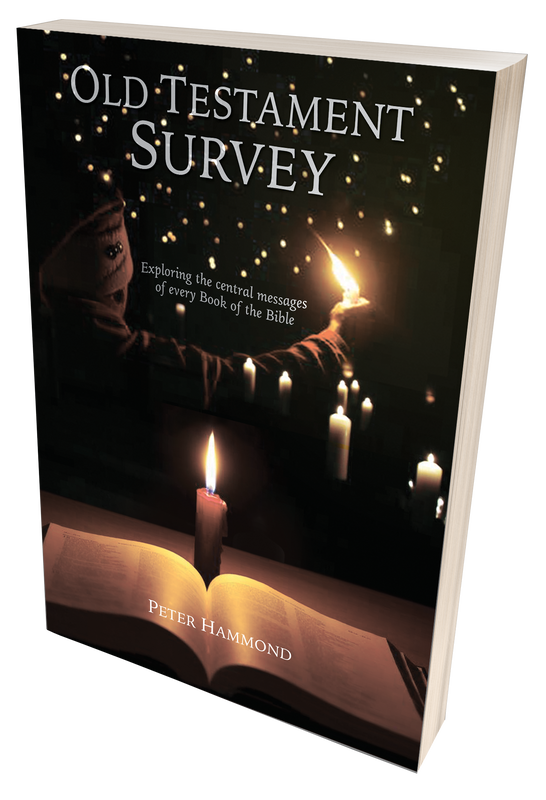
"Wherever you go, I will go; and wherever you lodge, I will lodge; your people shall be my people, and your God, my God." Ruth 1:16
A Famine in the Land In the days when the Judges ruled, there was a famine in the land of Israel. Elimelech took his wife, Naomi and their two sons, Mahlon and Chilion, away from Bethlehem, Judea, to the country of Moab. Bethlehem means 'the house of bread' and yet there was famine in Bethlehem. The land flowing with milk and honey was being judged by the Lord with famine. The name Elimelech means 'my God a King'. Naomi means 'pleasant'. However, their childrens' names were Mahlon (sickness) and Chilion (consumption). It must have been a terrible time in the history of Israel. The rabbis of Israel believed that Elimelech's family left Israel in the days of Ehud, and that Naomi and Ruth returned during the judgeship of Deborah. It is also believed that Samuel edited and included the book of Ruth in the Scriptures. Disobedience Leads to Disaster By taking his family for so long into the land of the heathen, Elimelech dishonoured God and set a bad example. His sons married Moabite women and Orpah is said to have returned to her gods (1:15). It does not appear that the Moabite women converted to the Jewish religion before their marriage to the sons of Elimelech. Naomi lost her husband Elimelech, and then her children. The country of Moab now held no attraction at all. Naomi determined to return to Bethlehem.
A Time to Leave
Naomi then urged her daughters-in-law to return to their father's house. She dismissed them with commendation and prayer: "Go, return each to her mother's house. The Lord deal kindly with you, as you have dealt with the dead and with me. The Lord grant that you may find rest, each in the house of her husband." (1:8-9) Discouragement or Discernment? Was Naomi right to discourage her daughters-in-law from going with her, when by taking them with her she might save them from the idolatry of Moab and bring them to the Faith and worship of the God of Israel? Naomi probably did want them to come, but she wanted them to make a deliberate choice, to count the cost (Matthew 8:19-20). Two Different Decisions Orpah kissed her mother-in-law and bade her farewell forever. Orpah's kiss showed that she had affection for Naomi and was sad to leave her but she did not love her enough to leave her country. Ruth however, put an end to the debate by a most solemn profession of her immovable resolution never to forsake her, nor to return to her own country and her old relations again. Determination and Dedication "Entreat me not to leave you, or to turn back from following after you; for wherever you go, I will go; and wherever you lodge, I will lodge; your people shall be my people, and your God my God." Here we have resolution, dedication, and conversion. "I have decided to follow Jesus! No turning back!" Ruth's loyalty and determination resound through the ages and provide a solid testimony and inspiring example to each one of us. Ruth presents a most admirable testimony. She is modest, meek, courteous, loyal, responsible, gentle, and yet decisive. Ruth always seems to be doing the right thing at the right time. She does it gracefully. Ruth never swerves from her unselfish purpose during the many trials that followed. She did not seem to complain because she had given up everything: her country, her relationships, or the chance to marry a man from her own country. She gave up everything with the resolution of fierce quietness. When Naomi saw that she was determined, she stopped trying to persuade her to change her mind. They both turned their faces resolutely towards Israel, the young and beautiful Ruth, and the old and wise Naomi. A Difficult Journey The distance they had to travel was under 200km, but this represented a long fatiguing and dangerous journey. For two women alone, with neither money nor protection, with no transport, they had to ascend mountains and descend into deep valleys on foot, crossing the Arnon and Jordan rivers. The journey would have taken them to desolate places, which would have tried them severely. They arrived in Bethlehem at the beginning of the barley harvest. This was the first of the harvests, with the wheat harvest following shortly thereafter. They now had an opportunity to provide for the coming winter. Gleaning When we take God for our God, we must take His people for our people and we must be willing to enjoy both the good and endure the bad. In Bethlehem, in order to support herself and her mother-in-law, Ruth performed the lowliest of tasks. Gleaning was a provision in the poor laws of Israel. The poor were allowed to follow the reapers and gather up the fragments of grain, which fell, or were left behind, for the poor. This was no free hand out; it was back-straining, long and hard work. Plainly, Ruth had a high work ethic. Her humility and industry were evident to all. She worked long and hard, from early till late. In the Field of Boaz Here we also see the hand of God's providence. "And she happened to come to the part of the field belonging to Boaz, who was of the family of Elimelech." (2:3). Boaz is described as a mighty man, of great wealth, mighty in the law. The name Boaz means 'in Him is strength.' The first time we read of Boaz he is coming to encourage the reapers: "The Lord be with you!" They answered him: "The Lord bless you!" (2:4). Boaz is evidently not only a diligent master, but also God-honouring believer. He is also observant and concerned as he asked after the gleaner, Ruth. The Generosity of Boaz Boaz encouraged Ruth and generously made provision for her. Boaz was kind to Ruth and showed her favour. He ordered his servants to be respectful to her and helpful. He commended her diligence on behalf of her mother-in-law, and prayed a blessing from the Lord God upon her labours. Boaz was evidently a man of God, a man of intelligence and observant. He appreciated Ruth's quiet industry, her modesty and purity. He made many provisions for her, and invited her to join his workers for the mid-day meal. When Ruth returned to Naomi at the end of the day with a bushel of barley and she hears that the man who has favoured her so is Boaz, Naomi exclaims: "This man is a relation of ours, one of our close relatives." A Kinsman Redeemer The Law of God provided for a close relative to be a kinsman redeemer to avenge wrongful death in a case of murder (Numbers 35:19-21); to buy back property which a poor relative many have been forced to sell to settle their debts (Leviticus 25:25); to redeem relatives who had been sold into slavery to settle their debts and set them free (Leviticus 25:47-49); and to marry the widow of a deceased relative (Deuteronomy 25:5-10). While Naomi makes her schemes in order to provide for Ruth a bright future, the Law of God had already done so. Boaz did not actually need to be manipulated into doing his duty by a mother-in-law's schemings; he was committed to doing the right thing anyway. Naomi advises Ruth to place herself at the feet of Boaz and seek his protection as a kinsman redeemer. Upon hearing the report back from her daughter-in-law, Naomi declared: "Sit still, my daughter, until you know how the matter will turn out; for the man will not rest until he has concluded the matter this day." (3:18) Boaz displays honourable and business-like character traits, going to the gates of the city before the elders and challenging the closer relative as to whether he was willing to fulfil his duty, then publicly informing all that he had the intention of becoming engaged to Ruth the Moabitess, the widow of Mahlon, to be his wife. A God-Honouring Marriage Some have tried to describe the romance in Ruth as an example of a mixed marriage. Of course, it was nothing of the sort. The people of Moab were descendants of Lot, the nephew of Abraham. The rabbis teach that Ruth had golden red hair and warm eyes, and the Scriptures tell us that David had red hair. Ruth was a convert to Yahweh; she had embraced the people, the culture, the language and the God of Israel. This was neither an inter-racial marriage, nor an inter-faith marriage. In the words of the Psalmist, Ruth could say: "I have chosen the way of Truth, I have set my heart on Your Laws." Psalm 119:30 Ruth turned her back on the idolatry of Moab and embraced the God of Israel. The book of Ruth is about wise choices. Many years before Joshua had challenged the people of Israel: "Choose for yourselves this day whom you will serve... but as for me and my household we will serve the Lord." Joshua 24:15 As Solomon had prayed: "So give your servant a discerning heart... to discern between right and wrong." 1 Kings 3:9, so both Ruth and Boaz evidenced a discerning heart. A Missionary Call The story of Ruth is a type of God's call to the gentiles. God's Sovereignty is seen throughout this beautiful story. We can see how everything was done in the light and in accordance with God's Law. Ruth was lifted out of obscurity and poverty to influence and prosperity. From the marriage of Ruth and Boaz sprang an auspicious lineage, the house of David (Matthew 1:5). Before the birth of her son Obed (which means servant) Ruth was assured that her child's name would be "famous in Israel" (Ruth 4:4). Naomi was told that the child would be a nourisher of her old age. Her neighbours, rejoicing with her declared "and may he be to you a restorer of life and a nourisher of your old-age; for your daughter-in-law who loves you, who is better to you than seven sons, has borne him." Ruth 4:15 An Ancestor of David Obed was the father of Jesse, who was the father of David. Ruth, the Moabitess who had chosen to follow her mother-in-law, and Naomi, who went back to Bethlehem, and who had embraced the God of Israel, became the great-grandmother of King David, and an ancestor of the Messiah Himself. "Wherever you go, I will go; and wherever you will lodge I will lodge; your people shall be my people, and your God my God." Ruth 1:16 Livingstone Fellowship P.O. Box 74 Newlands 7725 Cape Town South Africa Tel: 021-689-4480 Fax: 021-685-5884 Email: [email protected] Website: www.livingstonefellowship.co.za
0 Comments
Leave a Reply. |
OLD
TESTAMENT SURVEY ARTICLES
All
ARCHIVES |


 RSS Feed
RSS Feed